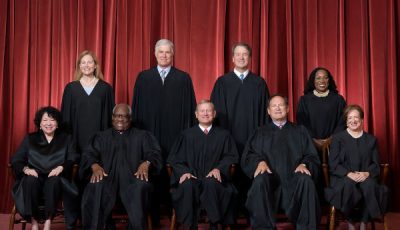Stormy’s Bid to Revive NDA Case Fails, Can Still Seek Attorneys’ Fees
 LOS ANGELES – For a case which generated floods of mainstream media ink and pixels when it was in its earlier stages, the most recent developments in Stormy Daniels’ challenge to the nondisclosure/non-disparagement agreement concerning now-President Donald Trump that she signed in 2016 have gone relatively unnoticed.
LOS ANGELES – For a case which generated floods of mainstream media ink and pixels when it was in its earlier stages, the most recent developments in Stormy Daniels’ challenge to the nondisclosure/non-disparagement agreement concerning now-President Donald Trump that she signed in 2016 have gone relatively unnoticed.
Search the news for stories on Stormy right now and what you’ll find will be about the prospect of Congressional Democrats calling her to testify about the hush money Trump paid her, or references to her in reports about prosecutors in Manhattan subpoenaing Trump’s tax returns in their investigation of the same payment. You may also run across a report that interim Columbus police Chief Thomas Quinlan has recommended that two officers from a disbanded vice unit be fired for their role in a bogus strip club raid in which Stormy was arrested last year.
To find any kind of update on Stormy’s NDA case, you’ll have to do substantially more digging. But, to be fair to the mainstream media, the most recent development in Clifford v. Trump isn’t quite as dramatic, bombastic or TV news soundbite-friendly as the action was when Stormy was represented by her (now-indicted) former attorney, Michael Avenatti.
In an order issued last week, Los Angeles Superior Court Judge Robert B. Broadbelt concurred with an earlier decision by U.S. District Court Judge S. James Otero in which Otero dismissed Stormy’s complaint as moot.
“As set forth in the Remand Order, the District Court has already determined that this case is moot,” Broadbelt wrote in his order. “Plaintiff cites no controlling authority for the proposition that a party’s claim that he or she is entitled to recover attorney’s fees or costs, which Plaintiff herself characterizes as a ‘collateral issue,’ constitutes an ‘actual controversy’ for purposes of determining mootness of an action…. Thus, because this case is moot, the court find that it is appropriate to dismiss it.”
Broadbelt continued, however, that just because the case has been declared moot and dismissed, this doesn’t mean Stormy can’t push ahead with her attempt to recover attorneys’ fees from Trump.
“The court notes that dismissal dos not divest the trial court of jurisdiction to consider ‘matters ancillary to the underlying action,’ such as a motion for attorney’s fees,” Broadbelt wrote. “Therefore, an order of dismissal will not prevent Plaintiff from filing a motion for an award of attorney’s fees pursuant to statutorily authorized procedures.”
Given that Trump has already been awarded $293,000 in attorneys’ fees in the ill-fated (and ill-advised) defamation case Stormy filed against Trump, being given leave to seek attorneys’ fees in the dispute over the 2016 NDA is a potentially important development. If she succeeds in her motion, it’s possible Stormy will be awarded more in fees than Trump was – although it’s impossible to say how likely that possibility is, until we see an accounting of her fees in the NDA case.
Even assuming Stormy prevails in her motion for attorneys’ fees, the court may award her a sum that’s substantially lower than the amount she seeks. This is what happened with the fees awarded to Trump, after all; his attorney Charles Harder originally asked for $390,000.
My hunch is that if Stormy persuades the court to award her attorneys’ fees, the media’s interest in the case will be revived – particularly if the amount awarded exceeds the amount she was ordered to pay Trump and can thus be considered a ‘loss’ for Trump.
In any event, while this case may be reaching its end, the epic tale of Stormy, Trump and their disgraced former attorneys is far from over. For starters, Avenatti finds himself at the center of more than one criminal case – including the one in which he’s accused of stealing $300,000 from Stormy. Meanwhile, Trump’s former ‘fixer,’ Michael Cohen, isn’t done talking to prosecutors either.













